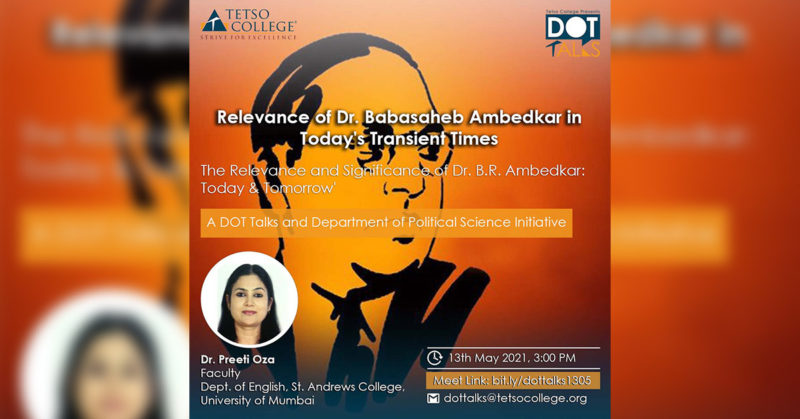Date : 13th May 2021
Time : 3:00 PM
Meet Link : bit.ly/dottalks1305
DOT Talks in collaboration with the Department of Political Science brings you an Online Lecture Series titled ‘The Relevance and Significance of Dr. B.R. Ambedkar: Today & Tomorrow’. The event will be graced by internationally recognized academicians, thinkers, and also our students who will be delivering consecutive lectures.
The fourth lecture in the series is called ‘Relevance of Dr. Babasaheb Ambedkar in Today’s Transient Times’ and will be delivered by Dr. Preeti Oza on 13th May 2021 at 3:00 PM.
Abstract: In his book “Mr. Gandhi and the Emancipation of the Untouchables” Dr. Ambedkar shows a serious concern – “Most parts of the world have had their type of what we call the lowly. The Romans had their slaves, the Spartans their helots, the British their villeins, the Americans their Negroes and the Germans their Jews. So the Hindus have their Untouchables. But none of these can be said to have been called upon to face a fate that is worse than the fate which pursues the Untouchables. Slavery, serfdom, villeinage have all vanished. But Untouchability still exists and bids fair to last as long as Hinduism will last.” Dr. Ambedkar should be seen as a social reformer. He was not a religious reformer as he did not try to establish a new religion or reform any religion. Dr. Ambedkar has better identification –
(1) Author of Constitution
(2) social reformer of untouchability
(3) an economist
(4) the best academician
(5) Both Vedanta and Buddhism scholar.
He has experimented with all the possible ways to achieve the goal of annihilation of caste. He wanted to give a push for Dalits to set an ideal quick during the fag end of his life. Because he knew without an ideal, Dalits cannot evolve culturally. And that was Buddhism – fix this ideal for own growth; evolve culturally and spiritually. So Indians have to remember this crucial point of history – instead of projecting Dr. Ambedkar as anti-Hinduism, He should be honored as a bridge between two paths – harmony of Vedanta and Buddhism. It is important to mention here the difference between religion and Dhamma. In his The Buddha and His Dhamma, Dr. Ambedkar has tried to make a distinction between religion and Dhamma. According to him, the word “religion” is an ambiguous word with more than one meaning. This is so because religion has passed through many ages and the conception of religion, too, has changed accordingly. At an early stage, religion was identified with magic. In the second stage, religion came to be identified with beliefs, rituals, ceremonies, prayers and sacrifices. In the third stage, God and soul entered religion. At present, says Dr. Ambedkar, religion means “belief in God, belief in the soul, worship of God, curing of the erring soul, propitiating God by prayers, ceremonies, sacrifices, etc.”
About the Speaker: Dr. Preeti Oza is an accomplished academician with specialized knowledge in the field of English Literature, Media Studies, Communication and related areas. She is offering demonstrated ability to improve learning outcomes across classes. She is proficient in Teaching-Learning and Pedagogy with more than 15 years of instructional academic experience. Research areas are Dalit and Buddhist Studies, Media Studies, Language Acquisition and Communication Skills including soft skills.

